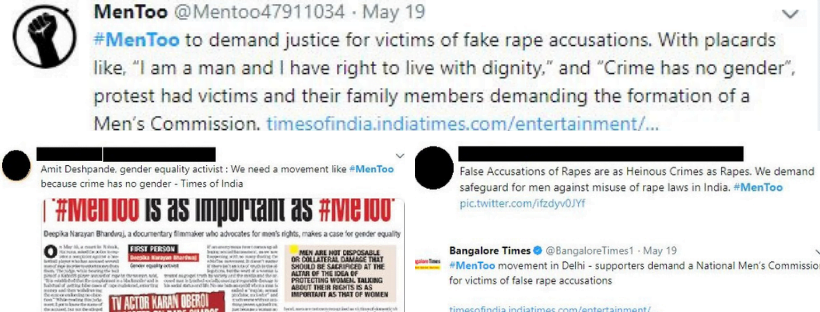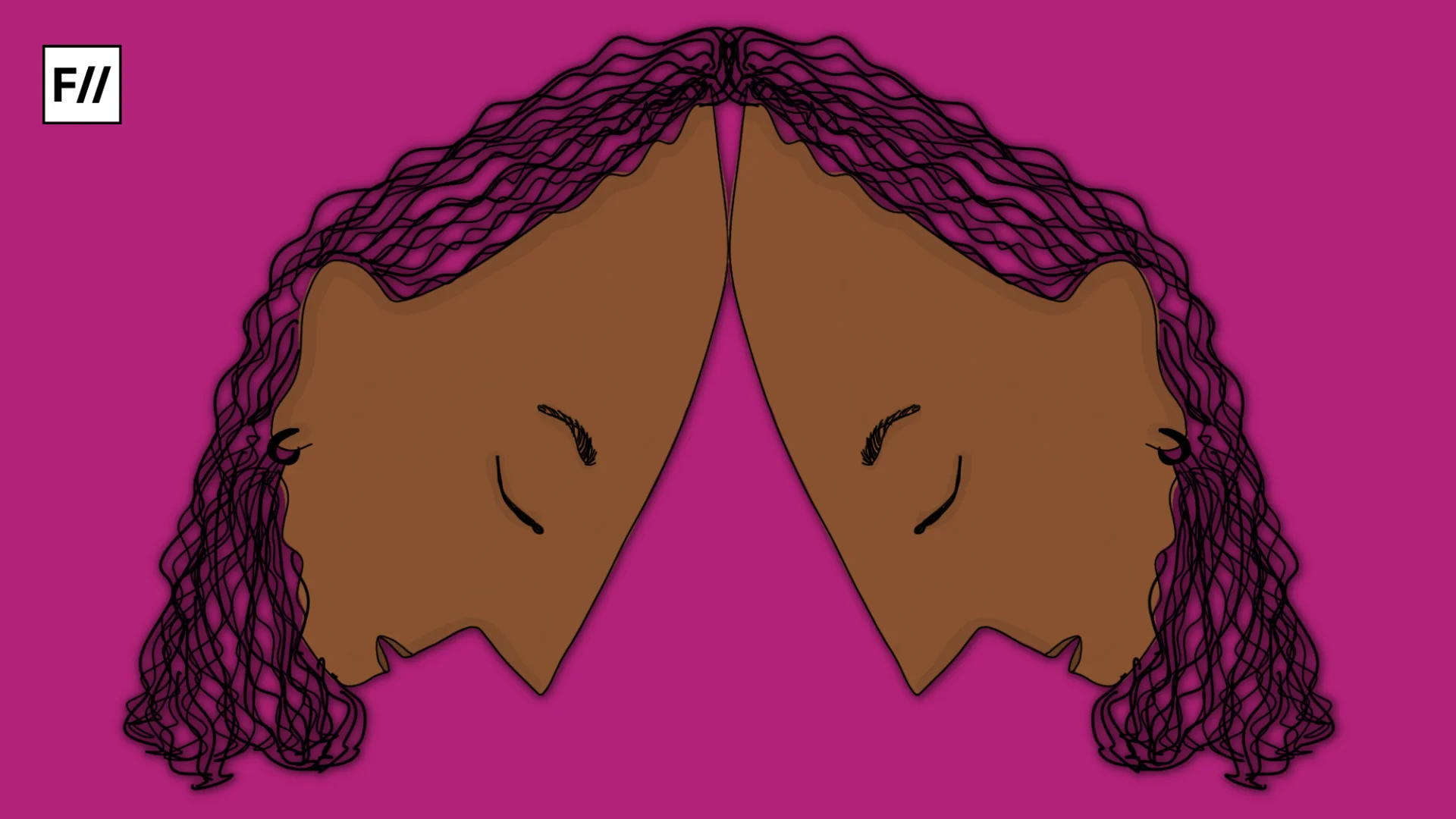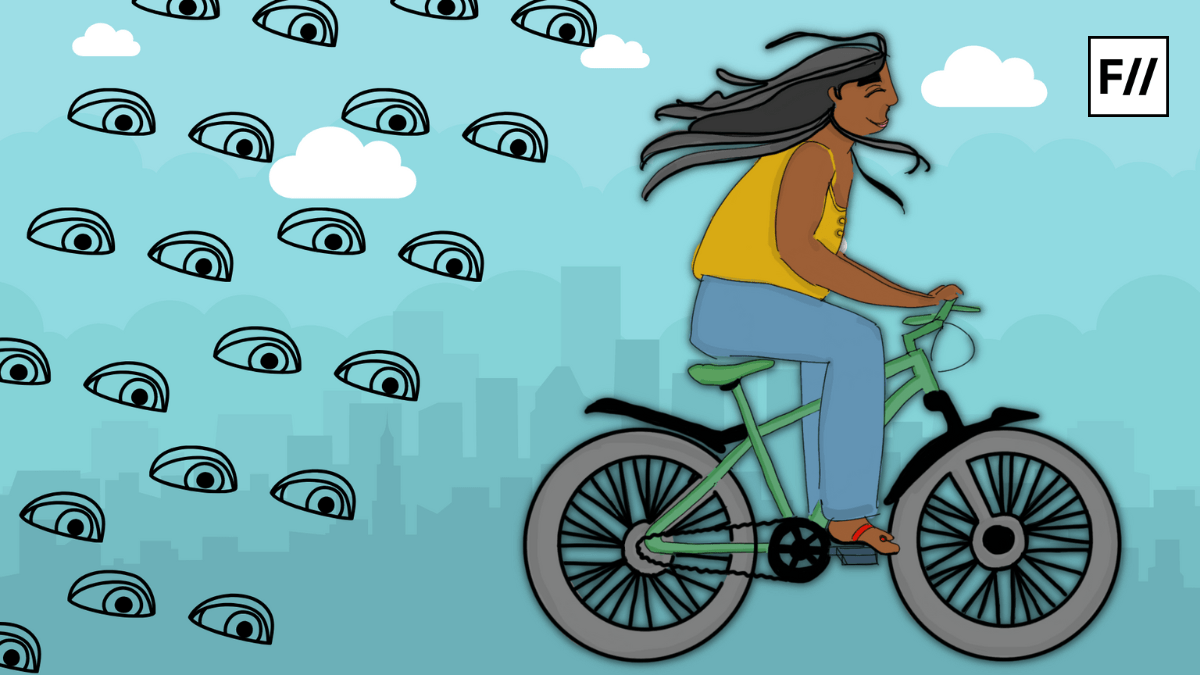As a response to the #MeTooIndia, we are witnessing the rise of #MenToo – a movement aimed at protecting men from false sexual misconduct accusations upending their lives. The #MeTooIndia movement arose as a long overdue acknowledgement of the historic, and ubiquitous (understatement) occurrences of sexual violence against women. At its core, sexual violence is about power, and that renders men and women susceptible to it. Are false accusations a problem? Yes. But to pretend as though the playing field is level, as if power is equally distributed is laughable. Patriarchy has dehumanized, subjugated, and disenfranchised women, concentrating power in the hands of men. Women are oppressed because they are women – something that (cishet) men do not face. Sure, they may be oppressed (by class, or race, for example), and there may be concerning instances of false accusations against men, but none of this is because they are men. Co-opting a movement designed to draw attention to the systemic sexual violence and intimidated silence women have faced is disingenuous, and little more than derailment.
#MenToo proponents claim that crime has no gender – which is true in the abstract, but illogical when it comes to sexual violence. It’s like responding #AllLivesMatter in response to the #BlackLivesMatter movement in America. Yes, all lives matter… there’s no dispute there. But this simplification utterly glosses over the unique racial violence that black people in the US face. The systemic oppression. Violence because they are black. The #MeTooIndia movement is similar. What it attempted to do was expose deep-rooted misogyny and violence against women that have endured for as long as we can remember. The extensive, systemic oppression and disenfranchisement, the violence that we have endured because we are women.
PATRIARCHY HAS DEHUMANIZED, SUBJUGATED, AND DISENFRANCHISED WOMEN, CONCENTRATING POWER IN THE HANDS OF MEN. WOMEN ARE OPPRESSED BECAUSE THEY ARE WOMEN – SOMETHING THAT (CISHET) MEN DO NOT FACE.
Also, this kind of widespread violence doesn’t occur in a vacuum. Often, the state (and state machinery) sanctions it – either overtly, or through inaction amounting to tacit approval. Two years ago, Human Rights Watch reported that people who have been raped still face a plethora of obstacles in their quest for justice, from the police, to the courts, to public opinion. This would be a good tie to remember that one of the pillars of the #MeTooIndia is to recognize that historically, women have rarely been believed. It is more burdensome for them to come forward, than it is for them to sit and suffer. By reframing the discussion around false accusations, #MenToo dismisses this entire history of women’s gagging.
Also read: What #MeToo Tells Us About Himpathy And Why Overcoming It Matters
Before men have a collective freak-out, maybe they should remind themselves that not much has changed even with #MeTooIndia. Take, for example, the manner in which the Supreme Court – the progressive check on a right-leaning country – handled accusations of sexual misconduct against Chief Justice Ranjan Gogoi by a former staffer. The court dismissed her allegations – made on an affidavit – as “without substance”. I still cannot wrap my head around this. Without. Substance. What? How? #MeTooIndia has been crucial in drawing attention to this type of systemic violence faced by women. Again, not a soul disputes the fact that the rights of the accused matter. But capturing #MeTooIndia, designed to acknowledge the ubiquity of sexual violence against women, to protect men’s rights glosses over the women’s history with sexual violence. This is disingenuous and just plain wrong.
Additionally, the #MenToo movement is drawing a false equivalence between sexual violence and false accusations. Let’s talk about false accusations for a second. I don’t think it’s worth thinking of women as passive, without agency, or mere victims of violence, and that they utterly incapable of it themselves. As I mentioned earlier, sexual assault is about power, rendering everyone susceptible. In several cases, false rape accusations are the result of parents covering up the “shame” of an unmarried daughter having sex. Research by Rukmini Shrinivasan shows that when parents find out that their unmarried daughters are in sexual relationships, their fear of “dishonour” to the family leads many to make bogus allegations of rape. This is serious, because it can severely undermine hard-won women’s rights. Here, it’s worth recalling women’s history of being silenced when it comes to calling out predators. Not only does the #MenToo movement ignore this, it also obscures the real issue: toxic masculinity, and patriarchy, which treats women as property, which equates chastity with family honour. And then the discourse around rape and sexual violence is diluted into a “he said-she said”.
Patriarchy breeds toxic masculinity that shames men who have experienced sexual violence from speaking out. And it is deeply problematic. But the #MenToo misses this.
That sexual assault is about power, that power is unevenly distributed, and that women are historically at the receiving end of sexual violence are some of the reasons why laws are framed so as to way to protect women. While #MenToo’s “whataboutism” doesn’t account for this, it also refuses to engage with consent, and women’s agency in any real way. Women’s agency is highly relevant, as more women in India are now engaging in consensual pre-marital sex. False rape cases often include cases of breach of promise of marriage. In an attempt to rectify this, the Supreme Court ruled earlier this year that cases of consensual sex after a relationship ends and the man declines to marry the woman is not rape. Additionally, there are procedural safeguards. Our criminal justice system places the burden of proving the crime on the accuser. Defamation laws also allow for the prosecution of women who are unable to prove public allegations against their abusers. This carries a maximum jail term of two years. If you’re following the news, you’re probably aware the journalist Priya Ramani is currently on trial, facing these exact charges for her allegations of sexual misconduct against former minister M.J. Akbar.
Also read: How The Men’s Rights Movement Hurts Male Survivors Of Sexual Assault
Patriarchy breeds toxic masculinity that shames men who have experienced sexual violence from speaking out. And it is deeply problematic. But the #MenToo misses this. This is what it should be about, although then it could well be subsumed within the existing #MeTooIndia movement. Perhaps a movement that considers toxic masculinity’s negative effects on men would be better off being called #NoMoreToxicMasculity. But we have, once again, missed the forest for the trees.
About the author(s)
Madhuri Sastry is the founder of the gender blog Chicks and Balances. She hols two LLMs, from the London School of Economics and New York University. Find Madhuri on Instagram @supportedfish and on Twitter @Chicks_Balances




